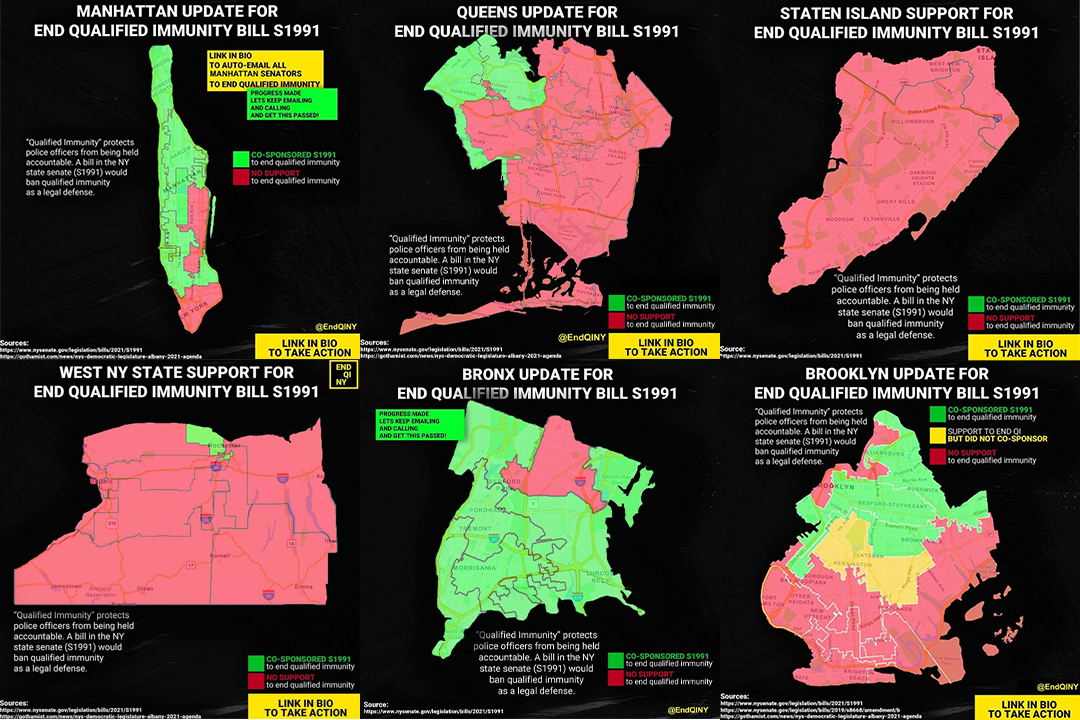After eleven months of protest demanding systemic police reform in the wake of the murder of George Floyd, advocates in New York are now pushing for a state law that would end long-established police protection in civil cases.
The End QI NY Coalition is campaigning for State Senate Bill 1991, sponsored by Sen. Robert Jackson, which would end the use of a legal doctrine known as qualified immunity. This doctrine protects public officials from individual liability in civil cases accusing them of violating a person’s constitutional rights.
A bill sponsored by state Sen. Zellnor Myrie would also end the use of qualified immunity as a defense, and a bill with similar goals was recently enacted by the New York City Council.
“We were protesting all summer, but now we need to see actual legislative and policy change that is in line with things that protesters were calling for,” said Katerina Siira, project director at New York University’s Peace Research and Education Program and a member of End QI NY. “I think people are excited about the fact that this is something tangible, this is something that you can actually see results.”
Revoking qualified immunity, advocates say, would hold police accountable while on the job by removing their protection from damage suits involving constitutional violations. The hope is that the bill will lead to systemic changes that will reduce such violations from happening in the first place.
“We would expect that [state police departments] would make changes to the way people are trained, the way people are supervised to reduce liability [and] to reduce the number of constitutional violations,” said Professor Alexander Reinert of the Cardozo School of Law at Yeshiva University.

The bill is not expected to sail through easily, said Matthew Levy, Jackson’s legislative director. As the bill gains support, he expects the police to lobby vigorously against its passage.
The New York Police Department and its union, the Police Benevolent Association, did not respond to requests for comment. In a February press release, the PBA objected to City Council bills that would revoke qualified immunity saying they “would chill the operations of law enforcement to such an extent that it would contribute to and accelerate the already unacceptable level of violence in New York City.”
It is difficult for a person alleging that a police officer violated their constitutional rights to get past the officer’s defense of qualified immunity. In a recent Texas case, Ramirez v. Guadarrama, two officers had responded to a call about a man having a mental health crisis. Despite knowing that the man, Gabriel Eduardo Olivas, had doused himself in gasoline and was highly flammable, one officer used his taser on Olivas, which set him and his home on fire. Olivas died later of his injuries.
Olivas’s family brought a lawsuit asserting that the police officers had violated Olivas’s Fourth Amendment rights when they tased him. The police officers claimed qualified immunity protected them from liability.
The family’s attempt to discredit that defense was denied in part, the federal judges ruled, because no previously established cases “involved a suicidal individual, flammable material, a credible threat of arson, or the potential immolation of others.”
That is, the details in the Olivas case did not match closely enough to any previous case in which a police action was found to be unconstitutional, so it could not dismantle the qualified immunity defense.
Using the qualified immunity defense, police officers accused of using excessive force or causing a wrongful death face little to no repercussions for their actions, said Levy. “We’re not asking for special treatment. We’re saying that police officers should be held to the same standard as everybody else.”
Local grassroots advocacy groups like the Bushwick Youth Coalition, Riders for Rights and the National Campaign to End QI teamed up with activists, lawyers, lawmakers and academics at the end of last year to form End QI NY and support Jackson’s bill. Their mission is three-fold: to educate the public on the concept of qualified immunity, create tools to make contacting representatives as easy as possible and provide general civic education.
The campaign is run primarily on End QI’s Instagram page. As the number of bill co-sponsors grows, they post updated district maps that show which public officials support the bill and which do not.
They also provide call scripts and automated emails constituents can use to easily contact their representatives. The coalition educates their communities on the concept of qualified immunity using examples from the Ramirez case and others, including Vos v. City of Newport Beach and Woodward v. City of Tucson to explain the doctrine.
The coalition has also launched an “Accountability Project” through which participants encourage five others to ask their representatives to co-sponsor S1991 and then pass on the message to five friends. Since the coalition launched in January, 12 additional senators have signed on, bringing the total to 15 co-sponsors so far.
After Gov. Andrew Cuomo signed legislation last summer repealing 50-A, which allowed police to conceal records of misconduct, and instituting other police reforms, coalition members are optimistic that Jackson’s bill will garner enough support to pass.
They are also energized by the recent passage in the U.S. House of Representatives of the George Floyd Justice in Policing Act, which includes provisions to limit the qualified immunity defense, and they say they are not slowing down.
“It doesn’t mean that just because it gets passed on the federal level, that the state level is no longer necessary,” said NYU’s Siira. “We want our elected officials to act now. And we don’t know how long that would take on the federal level, but we can do something now in New York State.”
About the author(s)
Persis Rao is a journalist pursuing a master's degree at Columbia Journalism School where she is on the Visual Craft track. Originally from New Jersey, she received her bachelor's degree from Barnard College where she studied sociology and human rights. She is interested in multimedia reporting on politics, local activism and climate. She can be reached at:
pzr2102@columbia.edu
Twitter: @PersisRao
Instagram: @praophotography



